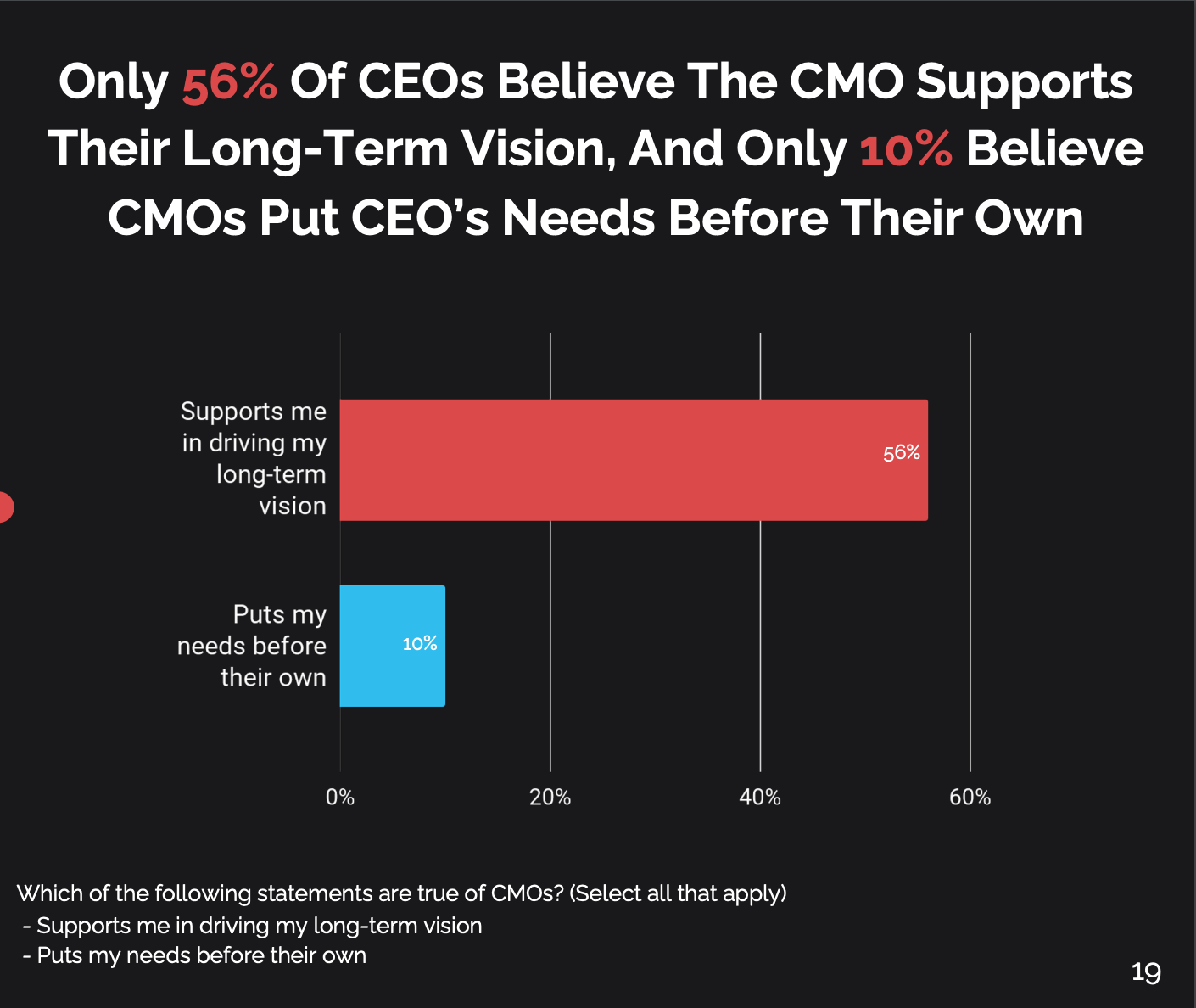Building Trust in the C-Suite: A CMO's Guide to Gaining Confidence from CEOs and Peers
Top Four Strategies From Change Management Expert Susan Wayne
CMOs seem to have a persistent problem: they often struggle to earn and keep the trust of their CEO, CFO, and CRO. When I wrote a few weeks ago that I was happy to be back at work because relationships were hard at home, I didn’t acknowledge that relationships at work are often hard too.
According to a Boathouse market survey from the spring of 2021, CMOs on average, don’t rank at the top of a CEO’s trust list:
Among the reasons?
When CMOs leave their jobs, they often talk about how they didn’t trust their CEO or peers. When CMOs are fired, it’s often related to the CEO not trusting their strategy, plans, insights, or ability to achieve results. It’s also hard for CMOs to build and maintain trust with their own leadership team and employees.
That’s why I was particularly excited to watch Xapa’s recent webinar on Building and Keeping Trust with Susan Wayne, founder / CEO of Changecast. She broke down the drivers of trust into four main pillars:
You should watch the webinar for all the texture (it was great), but a few highlights that stood out to me:
Affinity - In building affinity, one important aspect is mirroring or imitating the gesture, speech pattern, or attitude of another. This is a conscious or unconscious action of ‘being like’ each other and is advised in establishing relationships of all types (I read about it all the time in my parenting books). Affinity also includes having and creating things in common. (In the past, I used to watch Sports Center, though I had little interest in sports so that I could talk about the big games with my (male) peers or bosses. I also regularly ordered whatever drink my colleague/boss was getting at the bar - sometimes getting looks of surprise that I drank whisky, or an old-fashioned, but creating a discussion and connection). While mirroring and common interests can connect you, so can success in going through tough situations together and being there for each other in tough times (it can take time!). While building affinity with someone is a clear element of trust, there’s a double-edged sword around the challenge of diversity, inclusion, and belonging. As a leader, only liking “people like me” can undermine building a diverse team. As a person who may be different (the only woman on a leadership team?), conforming to others’ patterns can make you feel like you’re suppressing your true self. Watch the discussion at 40:15 in the video for more discussion.
Trust is earned and built over time. Despite our dreams, trust often isn’t given first but something that has to be cultivated to be earned.
Trust is situational and dynamic - someone can trust you in one area but not another.
The biggest action that undermines trust around integrity in a work setting is private conversations - side conversations where you share any information that is perceived as negative about anyone else. In part this is exactly what we felt in high school — if they are saying this about others in this private convo, what are they saying about you in others?
What can we do? Susan outlined several practical next steps:
1. Affinity:
Show genuine interest: Take the time to get to know others and understand their perspectives.
Empathy is key: Put yourself in others' shoes and be understanding of their needs and feelings.
Celebrate shared values: Find common ground and build connections based on mutual respect and appreciation.
2. Competence:
Deliver consistent results: Showcase your ability to produce quality work time and again. (Duh! Every CMO wishes we could do this more, but it’s still right)
Own your mistakes: Take responsibility for errors and demonstrate a willingness to learn and improve. (The CEO of Atlassian had deep trust with one of his Engineering leaders because even when he messed up, he was very open to hearing feedback and was quick to repair. The CEO heralded this relationship as one of his favorites. Other folks were sometimes defensive instead of receptive, undermining their trust relationship.)
Sharpen your skills: Actively invest in learning and development to hone your expertise.
3. Reliability:
Be a walking calendar: Follow through on commitments and meet deadlines consistently.
Communicate clearly: Keep others informed of progress and proactively address any potential issues.
Live up to your promises: Don't over-commit or make guarantees you can't keep.
4. Integrity:
Honesty is key: Always be truthful and forthright, even when it's challenging.
Act with fairness: Treat everyone with respect and avoid manipulation or deception.
Keep your word: Honor agreements and commitments, even when circumstances change.
This list looks clear and straightforward, but we all know it is more complicated to achieve in practice, in the flurry of all the things. I really appreciated Susan’s guidance on specific concepts and actions to build stronger, more resilient relationships. It’s unclear if there really is a more important success factor than trust - it appears to be the underpinning of our leadership… and our career.





I shared this framework with CMOs at the Hellman & Freidman CMO summit this week. A few things that came up in discussions and preparation -- trust considerations must be made for different regional and global cultures - Israelis are more direct, Japanese more harmony-oriented -- this affects conversations, expectations and ultimately, trust. Challenges also exist with multi-generational differences and perspectives that can lead to misunderstandings and mistrust. Interesting to see the different factors that influence our ability to establish and maintain trust!